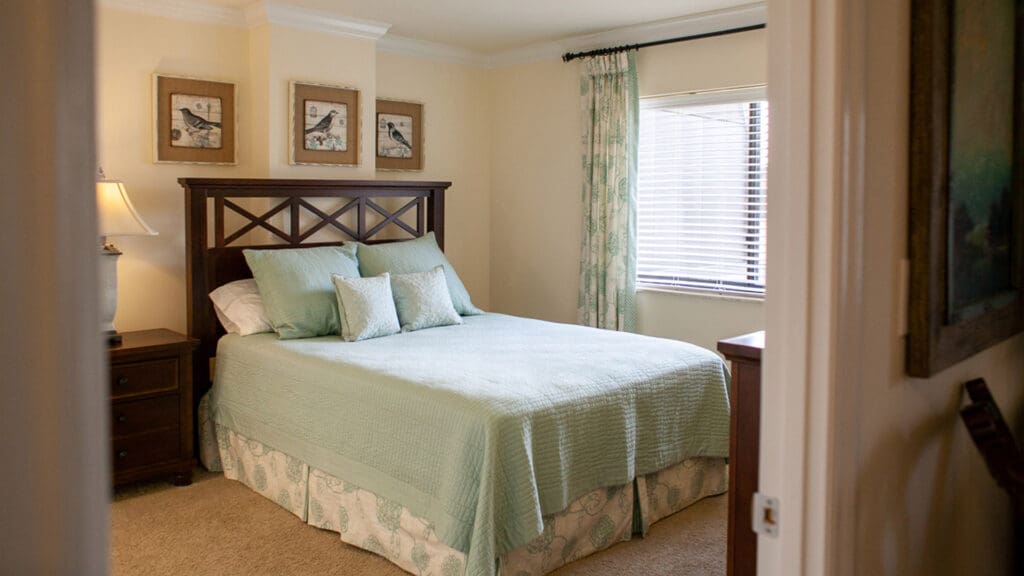When Spring rolls around, you always hear, “It’s time for Spring cleaning!” That can be a loaded statement for many people, especially seniors who may have lived in their homes for 30, 40, or even 50+ years. Where do you even begin when trying to declutter your home you’ve lived in for so many years? It’s overwhelming to say the least. Instead of Spring cleaning, some people decide to downsize – a term that surely raises some folks’ blood pressure. Those who make the decision to declutter their homes by downsizing may be preparing to move to a senior living community like Westminster Towers. However, Spring cleaning or downsizing has many benefits regardless.
Declutter Your Home, Declutter Your Mind!

Benefits:
- A decluttered home means a decluttered mind! Sometimes the more stuff you have, the more stress it brings on. For example, you wrote down an important phone number down, but can’t find it under all of the files you have on your desk – those files you’ll get to “tomorrow.” Who wants to spend all of their time searching vigorously for something? How frustrating!
- Fewer things means less to keep track of. The less stuff you have, the less stuff you need to remember. You’ll spend less time asking yourself, “Now where did I put that doohickey?” As you age, letting go of unneeded items will make your life easier.
- Less burden for your children. It can be difficult, both emotionally and logistically, for children to go through their parents’ things and decide what to keep, throw away, or donate. Instead of leaving an entire house full of furniture they don’t need, try to declutter your home and pick a few key items that are important to leave to the ones you love the most. Your children will thank you for doing so!
How to Declutter Your Home:
- Set a date and time to get started. It’s best to work in two to three hour blocks during a time you have the most energy. Don’t tell yourself, “I’m going to start this at 2pm” if you usually take a nap then. You will have zero motivation and will accomplish nothing. Set goals that you can accomplish by scheduling one room or zone at a time, and don’t work yourself to exhaustion.
- Have your supplies ready. You will need cardboard boxes, packing paper and tape, trash bags, color-coded stickers, and sticky notes. You’ll want to have everything ready to go before you start trying to declutter your home.
- Create sorting stations. Designate areas to place items you wish to sell, donate, give to family/friends and throw away. Choose a wall and label for each area. Then you can place the items in boxes or trash bags. A system like this will keep you organized even if the entire process takes a couple weeks.
- Sort. When you declutter your home, it’s helpful to sort all items that are alike together. For example, gather all of your shoes together. When you see them next to each other and how many you have, it can help with the decision-making process. Then, label accordingly. You can place a green sticker on shoes you wish to sell, pink stickers for charities, blue to give to someone, etc.
- Final decision time. The final step to declutter your home is to take all items you have sorted to your designated sorting stations and ensure they are where you want them. Remove accordingly!
What to Keep? What to Toss?
- Keep items you love.
- Keep things you have used/worn in the last six months or plan on using/wearing in the next six months.
- Keep items that fit your decor.
- Donate any china you don’t use.
- Toss/donate any holiday decor you no longer use.
- Toss/give away any presents given to you that you no longer use. If you are sentimental about the gifts, take pictures before getting rid of them.
If you feel like you need some encouragement and hands-on assistance, contact a Senior Move Manager. They are specially trained to help you declutter your home before a big move. To summarize this article: own your stuff, don’t let it own you!
Tips and resources pulled from a presentation from Fresh Start Transitions, LLC. They offer support services for senior adults and those in transition.
If you are looking to move your newly decluttered life to an excellent senior living community, Westminster Towers senior living apartments that can accommodate you whether you want to live independently or with assistance. Contact us today to learn more.